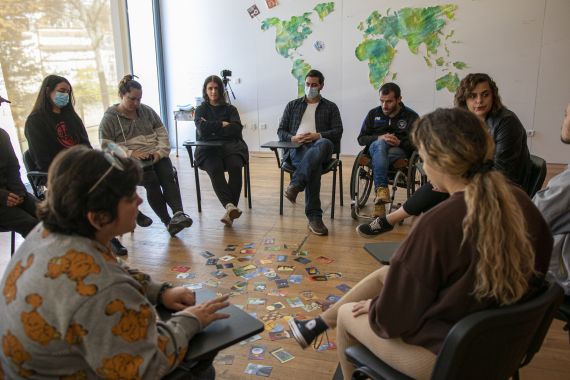Participation

It has many diverse forms - it can be conventional or unconventional, including activities such as voting, being members of political parties, serving on a local youth council, engaging through a youth organisation, or taking part in online political activism, boycotts, or a protest movement. The Youth Partnership research on youth participation aims to contribute to a better understanding of the phenomena linked to youth political participation by looking at a range of topics, including shrinking space for civil society, gender, digitalisation, new forms of participation, participation in climate movements, EU Youth Dialogue, impact of Covid-19 on youth spaces, advancement of populist ideologies, increased inequalities, and a rise of global youth movements.
Resources
Podcast: Youth civic space with Ana Mosiashvili, Carlotta Magoga, Gilda Isernia (2025)
Young people’s participation in the 2024 European elections by Anna Lavizzari (2025)
Review of the 9 cycles of the EU Youth Dialogue (2010-2022) by Dr Irina Lonean (2024)
Young people's participation and digitalisation: opening up space for new forms of political participation?, by Adina Marina Șerban and Demet Lüküslü (2024) and
illustration
Review of the 9 cycles of the EU Youth Dialogue (2010-2022): Executive summary
Contemporary forms of young women’s participation: priorities, challenges and ways forward?, Anna Lavizzari and Laden Yurttagüler (2023) and
illustration
New forms of political participation. Statistical survey, by Laden Yurttagüler and Eren Pultar (2023)
Evaluation of participant inclusion levels within the EU Youth Dialogue, by Dr Dan Moxon, supported by Ondrej Barta
Insights into Meaningful youth political participation in Europe (2021)
Covid-19 impact on youth participation and youth spaces (2022)
Disobedient youth: Lessons from the youth climate strike movement (2021)
Perspectives on youth participation (2020)
Shrinking democratic civic space for youth (2021)
Research on political participation of young people
Young women’s participation (2021)
Animated videos (2019)
 Activities
Activities
- Democracy and youth civic space research (2024)
- Seminar on young people's political participation (2023)
- Launch of the study: Meaningful youth political participation and video (2022)
- Symposium “The future of young people’s political participation: questions, challenges and opportunities” (2019)
- Edu4Europe Education for European democratic citizenship forum(2019)
- Perspectives on youth – political participation
- Symposium on youth participation in a digitalised world (2015)

